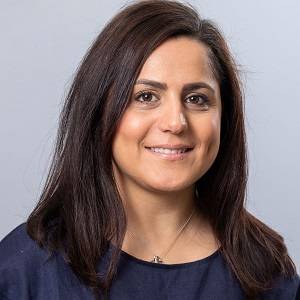Meet the Expert: Maryam Parhizkar
27 March 2023
Dr Maryam Parhizkar is a Lecturer in Pharmaceutical Engineering at the UCL School of Pharmacy. We met up with her to talk about her research interests and her journey so far.
Tell us more about your background – it would be great to find out more about your education and career so far.

I am an engineer by trade. I studied Mechanical Engineering at Brunel University and following graduation, I worked in a global engineering consultancy for a few years. I then decided to pursue a research degree in Biomaterials and joined Professor Mohan Edirisinghe’s group at the UCL Department of Mechanical Engineering to study the methods for high-throughput production of microbubbles that can be used as contrast agents for ultrasound imaging.
I stayed on and worked as a post-doctoral research associate (PDRA) for another 3 years, where my research focus was on developing a novel delivery method for an anticancer agent, cisplatin, for the treatment of head and neck cancer.
I joined UCL School of Pharmacy in 2019 as a Lecturer in Pharmaceutical Engineering, and have since been developing my research group as well as directing one of the MSc programmes (MSc Pharmaceutical Formulation and Entrepreneurship) in the division.
Can you tell us what interests you so much about new technologies – and the part this plays in your research?
The way new technologies change our life, from the way we look after our health to tackling issues like climate change, is fascinating. To be able to participate in research and innovation in an era where new technologies are fast-growing and easily integrated is a privilege.
In my research, we take advantage of some of these new technologies. For example, we employ nanotechnology to develop drug delivery systems for the localised treatment of diseases, such as cancer. This technique reduces damage to healthy cells in the body and allows for improved delivery of more potent chemotherapy drugs. We also develop innovative methods to manufacture these nano drug delivery systems and hope to employ artificial intelligence (AI) to make our processing methods smarter and more efficient.
What is unique about the MSc Pharmaceutical Formulation and Entrepreneurship at UCL?
The MSc Pharmaceutical Formulation and Entrepreneurship, or MSc PFE for short, is a unique programme which is taught by UCL School of Pharmacy and the School of Management. This course builds on the students’ scientific background and develops them further by educating them in the science of successful medicine design and development.
The students also have the opportunity to interact and be mentored closely by those who have direct experience in initiating start-ups. The highlight of the course is the two projects that students undertake in the summer, a short laboratory-based research project and another in the form of a business case analysis for a new pharmaceutical endeavour.
What do you enjoy most about teaching and lecturing your students?
What I like most about teaching is when I interact with motivated and intelligent students and how their eyes light up when they understand the concepts that I deliver in the lecture. The fact that I can see them grow confidently and go out into the real world and be very successful is very fulfilling.
Which bit of research are you most proud of and why?
I am proud of contributing to tackling challenges in human health through my research. Whilst curiosity has been the main driver in my research, the feeling that my research could potentially have a lasting impact makes me even more motivated. I have realised this can only happen if I work closely with clinicians, patients and industry.
A great example is the research that I am currently conducting with Dr Benji Schreiber at the Royal Free Hospital on finding novel targeted treatments for Pulmonary Hypertension, a rare but incurable disease. In this work, we are developing functionalised nanoparticles with the aim to deliver novel therapeutic strategies (such as anticancer therapy) directly to the pulmonary endothelium combined with simultaneous imaging capability.
We are also engaging with the patient community through PHA UK charity with the hope to raise awareness of this serious condition and inform them of the research towards finding a cure.
What motivates you at the start of each day?
The ambition and hope for a brighter future for all and how I can play my part by doing impactful research and be part of a community that shares the same goals. Working in an upbeat and dynamic environment like UCL with endless opportunities, I start my day knowing that by the end of the day, I will learn something different from the day before and I can get closer to achieving my goals.
What advice would you give your younger self?
Time is precious and never underestimate yourself!
Further information:
- Dr Maryam Parhizkar staff profile
- UCL School of Pharmacy
- MSc in Pharmaceutical Formulation and Entrepreneurship
- UCL Mechanical Engineering
- UCL School of Management
- Royal Free Hospital
- PHA Charity Magazine (Page 66-67)
 Close
Close

